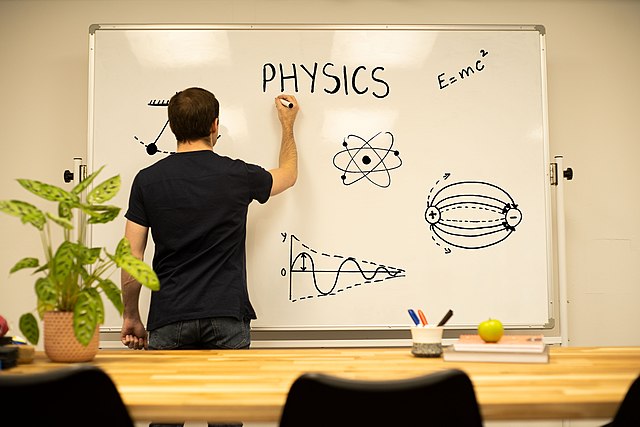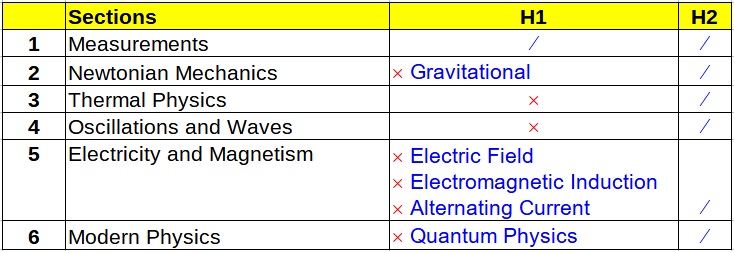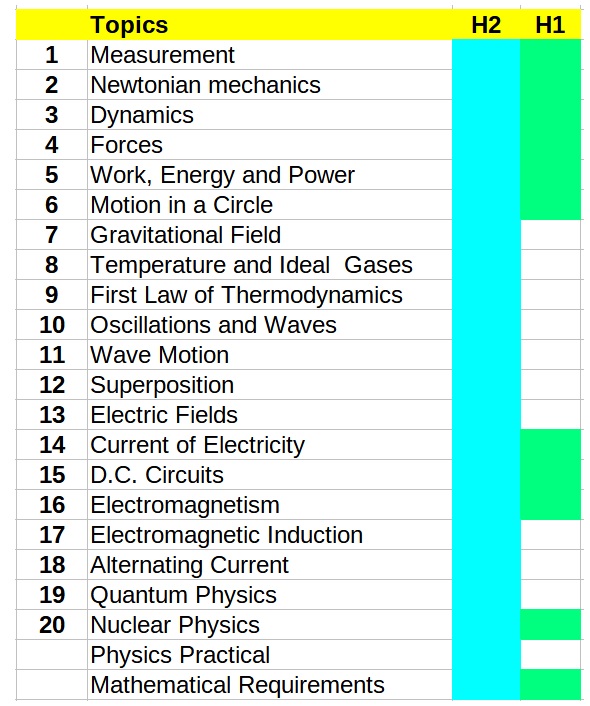
Introduction
In Singapore, the education system is known for its rigour and emphasis on academic excellence. Among the various subjects offered at the pre-university level, Physics stands out due to its critical role in understanding the natural world and its applications in technology. The A level physics syllabus is divided into two main levels: Higher 1 (H1) and Higher 2 (H2). This article aims to provide a comprehensive comparison of the H1 and H2 Physics syllabuses, focusing on their structure, content, assessment methods, and the implications for students.
Overview of the H1 and H2 Physics Syllabuses
H1 Physics
The H1 Physics syllabus is designed for students who may not be pursuing a deep specialisation in Physics but still wish to attain a fundamental understanding of the subject. It is typically taken by students who are combining subjects for a more rounded education, often alongside subjects like Biology or Economics. The H1 syllabus includes key concepts and principles from Physics, offering students a broad overview without delving deeply into the complexities of the subject.
H2 Physics
On the other hand, the H2 Physics syllabus is tailored for students who are keen on a more intensive study of Physics. This syllabus is more advanced and covers a wider range of topics in greater depth. H2 students are often those considering further studies in fields such as Engineering, Physics, or related sciences. The H2 syllabus is structured to provide a thorough understanding of both theoretical and practical aspects of Physics.
Structural Differences

Curriculum Design
The H1 Physics syllabus is more concise, focusing on essential topics such as Mechanics, Electricity, and Nuclear Physics. In contrast, the H2 syllabus includes additional areas such as Thermal Physics, Oscillations and Waves, and Nuclear Physics.
For instance, while both syllabuses cover Newtonian mechanics, the H2 syllabus goes further into advanced topics such as motion in a gravitational field and oscillations, providing a more comprehensive treatment of the subject.
Depth of Content
The depth of content is another significant difference. H1 Physics often emphasizes conceptual understanding and application, while H2 Physics requires a more analytical approach. H2 students engage in more complex problem-solving scenarios and are expected to apply mathematical techniques to derive and manipulate equations governing physical phenomena.
Practical Components
Both syllabuses include practical work, but the extent and complexity differ. H2 Physics has a more extensive laboratory component, which not only requires students to conduct experiments but also to analyze data critically and relate it to theoretical concepts. H1 Physics includes practical experiments but typically requires less in-depth analysis and may focus more on verifying established principles.
Content Comparison

The core topics in both syllabuses include:
Mechanics: Both syllabuses cover topics such as kinematics and dynamics. However, H2 delves deeper into concepts like circular motion and gravitation.
Waves: While H1 syllabus does not go into wave phenomena, H2 includes a comprehensive analysis of wave behavior, such as interference and diffraction.
Electricity and Magnetism: H1 Physics provides a good understanding of circuits and motors, while H2 Physics also explores concepts such as electric fields and electricity generation.
Thermodynamics: H1 syllabus also leaves out thermodynamics, while H2 students engage with more intricate scenarios and applications, including thermodynamic cycles and heat engines.
Additional Topics in H2 Physics
H2 Physics includes topics not found in H1, such as:
Modern Physics: Topics like quantum mechanics, atomic structure, and nuclear physics are introduced in H2, providing students with insights into contemporary scientific advancements.
According to this year’s (2024) Singapore H1 and H2 physics syllabus, the number of papers and marks weighting are as follows.
H2 Physics papers

H1 Physics papers

Assessment Methods
Examination Structure
The assessment for both H1 and H2 Physics typically includes a combination of written examinations and practical assessments. However, the expectations and weightings differ significantly.
H1 Physics: The examination format usually consists of structured questions focusing on application and conceptual understanding.
H2 Physics: The H2 examination involves more complex problem-solving and may include a variety of question types, such as multiple-choice, structured questions, and long-answer questions that require more critical thinking and analytical skills
Practical Assessment
Practical assessments are integral to only the H2 syllabus. While H2 students have to engage in laboratory work, H1 students do not need to do experiments. The practical component for H2 includes a practical exam paper that requires planning, conducting experiments, and analysing results - and carries 20% of the overall assessment.
Implications for Students
Academic Pathways. The choice between H1 and H2 Physics has significant implications for students’ academic and career pathways. H1 Physics may suit students who wish to maintain a broader focus on career options, while H2 Physics is ideal for those who plan to pursue careers in science, technology, engineering, or mathematics (STEM).
Skill Development Studying H2 Physics equips students with advanced problem-solving skills, critical thinking, and the ability to analyse complex systems. These skills are invaluable for those entering higher education or the workforce in technical fields. H1 Physics, while still providing essential skills, focuses more on general understanding and application rather than specialised knowledge.
Study Commitment The commitment required for H2 Physics is substantially greater than that for H1. Students in H2 need to dedicate more time to studying, mastering complex concepts, and completing practical assignments. This rigorous approach can be challenging but also rewarding for students who are passionate about the subject.
Summary
The H1 and H2 Physics syllabuses in Singapore serve different educational purposes and cater to distinct student needs. H1 Physics offers a foundational understanding suitable for a wide range of academic pursuits, while H2 Physics provides a deep dive into the subject, preparing students for specialised studies in science and engineering. Ultimately, the choice between H1 and H2 Physics should align with students’ academic goals, interests, and career aspirations, as both paths offer unique benefits and challenges in the landscape of Singapore’s educational system.
Choosing between H1 and H2 Physics is not merely an academic decision; it is a reflection of a student's interests and ambitions. As the world increasingly relies on scientific innovation and technological advancement, the knowledge and skills gained from studying Physics at either level will remain invaluable assets in the ever-evolving global landscape.
A Comparative Analysis of Job Prospects for H1 and H2 Physics Students in Singapore

Introduction
In Singapore’s competitive job market, educational qualifications play a crucial role in shaping career opportunities. Physics students find themselves equipped with distinct skill sets and knowledge bases. While both H1 and H2 Physics provide valuable insights into the principles of physics, the depth of study and the career trajectories they offer can differ significantly. The choice of H1 or H2 Physics would factor in options to further education and eventual job prospects.
Overview of H1 and H2 Physics
H1 Physics
The H1 Physics syllabus is designed for students seeking a foundational understanding of physics, typically taken alongside other subjects that may not require extensive scientific expertise. This syllabus emphasises essential principles and concepts, providing a broad overview without delving deeply into complex theories and advanced mathematics. H1 Physics is often pursued by students aiming for a well-rounded education, perhaps to complement studies in fields such as Biology, Humanities, or Social Sciences.
H2 Physics
Conversely, the H2 Physics syllabus caters to students interested in a comprehensive and rigorous study of physics. It covers a wider range of topics in greater depth, including advanced mechanics, electromagnetism, thermodynamics, and modern physics. H2 Physics is often a prerequisite for students planning to enter science and engineering disciplines at the university level, making it a more specialised and intensive option.
Further Education and Specialisation
H1 Students While H1 students can pursue higher education, they may face more challenges in competitive fields that require rigorous scientific training. Many opt for degrees in business, humanities, or social sciences, where their physics background provides a unique perspective but may not be the primary focus.
H2 Students H2 students are more likely to continue their studies in STEM fields, including physics, engineering, computer science, and applied mathematics. Their in-depth knowledge makes them strong candidates for top universities and competitive programs, significantly enhancing their career prospects.
Conclusion
In summary, the job prospects for H1 and H2 Physics students in Singapore differ significantly based on the depth of study, skill sets acquired, and the industries they can enter. H1 Physics provides a broad understanding that can lead to diverse career options, but may require additional qualifications for specialised roles. In contrast, H2 Physics equips graduates with advanced skills and knowledge that open doors to highly sought-after positions in engineering, research, and technology.
Ultimately, the choice between H1 and H2 Physics should align with students’ career aspirations and interests. For those aiming for a career in STEM fields, H2 Physics is often the more advantageous path, while H1 Physics can offer a flexible foundation for various professional pursuits. As Singapore continues to emphasise innovation and technology, the demand for skilled graduates in physics will remain strong, providing opportunities for both H1 and H2 student.
References
"Can’t decide between H1 or H2 Physics?", Physics Academy, seen on 4 October 2024.
"Post-Secondary Physics: Surviving H1 and H2 Physics in JC", Super Physics Tuition, seen on 4 October 2024.
You can improve your understand and skill in physics at Dr Hock's maths and physics tuition.